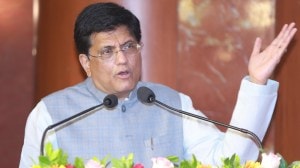Congress act: bully gets burnt
When Harikesh Bahadur and Satyavrat Chaturvedi had first gone to Bihar to ascertain Congress workers8217; views on the possibility of an al...

When Harikesh Bahadur and Satyavrat Chaturvedi had first gone to Bihar to ascertain Congress workers8217; views on the possibility of an alliance with Laloo Yadav, even before one of the speakers had completed the sentence tentatively suggesting the tie-up, the meeting broke into pandemonium.
While fashioning its electoral strategy, the Congress had to take into account the state unit8217;s strident opposition to the RJD. An alliance could have sent the Congress cadre scurrying to other groups, if the party had limited itself to fighting in only the 25 seats Laloo was offering it.
While that was one compulsion for the Congress, it could not openly ally with Ram Vilas Paswan either and contest all the 243 seats between them, given its reliance on Laloo8217;s 24 MPs in Delhi. The story would have been different had Nitish Kumar also been part of this alliance, which seemed a possibility at one stage. But this required the ability to take risk and put in place a back-up plan to compensate for Laloo8217;s 24. That was not a risk the Congress was prepared to take, given the support the Left parties and the NCP were giving Laloo. So the Congress came up with a formula which was neither here nor there 8212; and which left it with only the leftover seats.
The Congress plan in Bihar 8212; to prevent the extinction of its state unit, to keep the central government safe and to rein in Laloo and emerge as king pin in a secular government 8212; went horribly wrong.
But then the party had limited options to play with in Bihar. What is simply incomprehensible is the mess the Congress made in Jharkhand. It allowed a state that was within its reach to slip out of its hands. It announced a unilateral arrangement of seat-sharing only with the JMM without talking to the RJD, when it had fought the 2004 Lok Sabha elections in Jharkhand with all its allies on board and come up with a magnificent showing. To put Laloo in his place, it ended up giving Shibu Soren more seats than was necessary, indirectly acknowledging him as chief ministerial frontrunner, thereby intensifying the factional war inside the JMM and alienating the upper castes in the process 8212; all of which took its own toll.
Above all, Jharkhand underscored the old Congress mindset 8212; the imperious old party, living in the past and resorting to unilateralism. As it is, smaller partners are wary of its big brotherly attitude which should have no place in the coalition age. The truth is that in any coalitional arrangement, the big party has to give, give and give in order to retain power, for it has the highest stakes.
How the Congress behaved with Laloo in Jharkhand has been noted by all UPA constituents. An agitated DMK immediately reacted by giving notice to the Congress to take action against its Union minister E.V.K.S. Elangovan for having the temerity to state that the DMK would have to accept the Congress as its partner in any future government in Tamil Nadu.
The principle of 8220;give and give8221;, however, also applies to the bigger player in the state. Laloo was being no less cocky when he refused to give Ram Vilas Paswan his due for the RJD8217;s whopping victory in the 2004 elections. Shibu Soren, who saw himself as a chief ministerial candidate, failed to carry along his senior colleague Stephen Marandi, though a patch-up between the two is now underway.
It is not the poor performance of the Congress in Bihar and Jharkhand which will create problems for the UPA government. On the contrary, this is a reassuring signal to the Congress8217;s allies, who are happier doing business with a relatively weaker Congress that is dependent on them than with a resurgent party. The Congress8217;s revival, they know, will be at their expense and this makes them jittery. This is as true of Laloo as it is of Mulayam, and of Shibu and the Left. Had the Congress mopped up many more seats in both states, besides winning Haryana, the regional parties would have intensified their efforts to form a non-BJP, non-Congress Third Front, deepening the divide in the UPA. The Left parties have already started talking about the formation of the Third Front.
Bihar will, however, cast a shadow over the UPA government if two of its senior ministers, Laloo Yadav and Ram Vilas Paswan, continue to bay for each other8217;s blood. Unless some kind of a truce is effected between the two, Laloo will begin to demand Paswan8217;s ouster from the UPA and Paswan will prevent the formation of a secular government in Patna.
President8217;s Rule in Bihar may vindicate Paswan in the sense that he would have successfully prevented Laloo from coming to power. It will give time for new equations to be formed, and even if the LJP chief has to align with Laloo later, there would have been a cooling off period. Central rule may also appear to be a tempting option for the Congress. It may think that it will be able to rule Bihar from Delhi. But in reality it will be the Congress which will get the flak apart from getting caught in the crossfire of its allies. President8217;s Rule will only embitter Laloo. This is going to be a test of Sonia Gandhi8217;s leadership.
The biggest casualty of the recent election has been trust between the Congress and Laloo, and it is trust which is the cementing force in any coalition arrangement. This could create problems in the UPA in the future.
- 01
- 02
- 03
- 04
- 05































